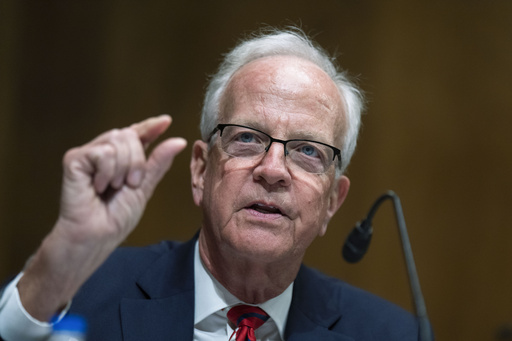WASHINGTON — Republican Senator Katie Britt is actively working to ensure that the Trump administration’s Department of Government Efficiency (DOGE) does not negatively impact what she describes as “life-saving, groundbreaking research” at top-tier institutions, notably at the University of Alabama in her state.
Kansas Senator Jerry Moran has voiced concerns that food produced by heartland farmers may go to waste instead of being distributed internationally as the U.S. Agency for International Development (USAID) undergoes significant reductions.
Idaho Representative Mike Simpson highlights the risks facing national parks due to staffing cutbacks as summer approaches, warning that this could hinder their ability to cope with the influx of visitors.
“We need to have a discussion with DOGE and the administration regarding their recent actions,” said Simpson, who is a veteran member of the Appropriations Committee. “This is a matter of concern for all of us.”
In recent public statements and behind closed doors, Republican lawmakers are beginning to raise their voices to safeguard local interests, key industries, and job markets that they believe are threatened by President Donald Trump’s executive orders and the aggressive initiatives being pursued by Elon Musk’s DOGE.
While the Democratic Party has expressed outrage over the repercussions of Trump’s budget cuts on citizens across the country, the reactions from Republicans have largely been more individualized rather than a united front. Few have openly challenged the goals or legality of the DOGE initiative, which the party has predominantly supported. However, these growing concerns represent the initial signs of GOP resistance to Trump’s sweeping changes across federal agencies.
“The electorate demanded comprehensive government reform, and that’s precisely what they’re going to get,” Musk stated during a Tuesday meeting at the Oval Office alongside Trump.
The situation unfolding in Washington is unprecedented, with Trump issuing executive actions at an accelerated pace and Musk’s team examining budgets and agencies for what he identifies as waste and fraud. There are currently numerous lawsuits claiming that Trump and DOGE are acting unlawfully.
Historically, presidents have exercised broad authority to implement executive orders and proclamations to achieve their policy objectives; however, they typically focus on a select few priorities rather than exerting such expansive power across the entire government.
Former President Barack Obama notably used executive actions to shield an entire class of immigrants known as “Dreamers” from deportation. Similarly, former President Joe Biden invoked executive powers to alleviate student loan burdens for millions. Both actions have faced legal challenges and are still navigating the court system.
Senate Minority Leader Chuck Schumer remarked that DOGE is applying a “meat ax” to federal operations.
“If you intend to make cuts, they should be discussed and debated in Congress, not conducted unlawfully,” stated the New York senator.
The uncertainty surrounding the future is evident as judges are swiftly imposing restrictions on many of the White House’s moves. Both Musk and Vice President JD Vance have called into question the legitimacy of judicial oversight, which is a foundational element of U.S. democracy designed to maintain a balance of power.
House Speaker Mike Johnson mentioned that he engaged with Musk earlier in the week, expressing confidence that DOGE is acting within acceptable parameters without encroaching on Congress’s authority regarding the management of taxpayer funds or oversight of executive functions.
“What they’re doing is truly exciting because it addresses the issues that Congress has overlooked in recent times,” Johnson commented, referring to the ongoing scrutinies of federal expenditures.
Alongside her peers, Senator Britt raised her concerns about Trump’s restrictions on the National Institutes of Health grant program, which adversely affects educational institutions and medical research facilities nationwide.
“A precise and focused approach is crucial as the administration strives to achieve its objectives at the NIH,” the senator commented in a statement.
North Carolina Republican Senator Ted Budd indicated he has received feedback from constituents in his region, which is home to the notable Research Triangle. Additionally, Senator Susan Collins, who chairs the Senate Appropriations Committee, highlighted how researchers in Maine are tackling significant issues like Lyme disease, Alzheimer’s, and diabetes, providing another voice against funding caps.
“Investments in biomedical research yield unparalleled benefits for American families,” Collins asserted in her statement.
As the dismantling of USAID progresses, Senator Moran emphasized the vital role of U.S. food assistance in supporting the hungry, enhancing national security, and providing crucial markets for farmers, especially in times of low commodity prices.
He indicated he has been in discussions with the Department of Agriculture and the White House regarding the need to resume the procurement and shipment of American-grown food.
Moran and his colleagues are working on legislative proposals to transfer the management of food aid from USAID to the USDA.
In a recent update, Moran stated, “GOOD NEWS: The State Department has given the green light for shipments to recommence, permitting NGOs to distribute the $560 million of American-grown food aid currently in U.S. and global ports to those in need.”
He expressed gratitude to Secretary of State Marco Rubio for ensuring that this critical aid reaches those in need before it deteriorates.
Nonetheless, it remains uncertain whether the aid efforts will receive the necessary funding to continue, and the severe cuts to global aid logistics raise questions about whether sufficient manpower can be secured to deliver the delayed food supplies, as reported by aid organizations.
In Florida, Representative Carlos Gimenez is advocating for Venezuelans living in the Miami area who are protected under Temporary Protected Status as the Trump administration seeks to terminate the program.
Gimenez wrote to the administration last month urging a case-by-case consideration of Venezuelans’ situations.
“I back the president on most initiatives,” Gimenez stated, “but as a congressman, I must also represent my constituents’ interests.”
When asked about his influence, he replied, “I’m not powerless. I represent my constituents as a member of Congress.”
